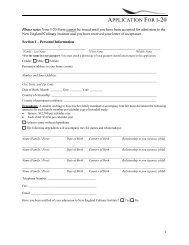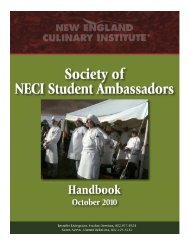Academic Catalog - New England Culinary Institute
Academic Catalog - New England Culinary Institute
Academic Catalog - New England Culinary Institute
You also want an ePaper? Increase the reach of your titles
YUMPU automatically turns print PDFs into web optimized ePapers that Google loves.
À la Carte cooking may be the most challenging<br />
segment of the food service industry. Skills introduced<br />
in this class, and integral to every à la carte situation,<br />
include adaptability, ability to anticipate future needs,<br />
timing and sequencing, speed and accuracy of efforts,<br />
and responding with a suitable sense of urgency in<br />
unpredictable settings. The main lessons of this class<br />
all involve organization, efficiency, speed, and<br />
communication. Successful students demonstrate<br />
advanced preparation, proper attitude, personal<br />
responsibility, and teamwork. These skills can be<br />
translated into any aspect of the industry. At the end of<br />
this course students will be better prepared to face the<br />
demands of their first internship.<br />
Introduction to Artisan Breads<br />
BMBC1301 – 84.0 clock hours<br />
BMBP1302 – 2.0 credits<br />
The Artisan Bread Baking Practicum is in a hands-on<br />
production environment, allowing students to develop<br />
and refine their skills in the bakeshop and practically<br />
apply knowledge from the Baking Theory class. In the<br />
Artisan Bread Baking Practicum students encounter a<br />
wide range of products currently produced in an artisan<br />
bakeshop, such as sourdough, old-world style breads,<br />
and decorative breads. Students also experience<br />
working with various types of pre-ferments. Students<br />
are involved in daily bakeshop planning and product<br />
marketing, as well as all stages of production from<br />
mixing, and shaping to baking.<br />
Introduction to Basic Pastries<br />
BMBP1503 – 4.0 credits<br />
BMBC1503 – 168.0 clock hours<br />
Introduction to Basic Pastries is a hands-on production<br />
environment, allowing students to develop and refine<br />
their skills in the bakeshop and to practically apply<br />
knowledge from their Baking I class. Areas of<br />
concentration within the kitchen allow students to<br />
focus on advanced cookies, basic desserts, and cake<br />
assembly. Students are involved in all stages of<br />
production from scaling and mixing through baking<br />
and decorating.<br />
Introduction to Labor Management<br />
HMBM2300 – 2.0 credits<br />
In this course, students examine the strategies used by<br />
a supervisor when managing employees. Lectures and<br />
role-playing help students develop skills in applicant<br />
screening and interviewing, staff orientation and<br />
supervision, performance appraisals, and termination<br />
practices. Students explore the job search process from<br />
the applicant’s perspective as a counterpart to the<br />
management perspective.<br />
Introduction to Marketing Theory & Research<br />
HMBM3702 — 3.0 credit<br />
This course is an introduction to marketing concepts and<br />
their application, and prepares students to evaluate and<br />
improve existing marketing practices for higher<br />
profitability, customer satisfaction, and efficient use of<br />
resources. Students examine the significance of a<br />
marketing plan, and how market research can help<br />
influence the various types marketing strategies<br />
management can use—from new product awareness, to<br />
market re-positioning. This course also gives students<br />
the opportunity to explore the world of marketing<br />
beyond the conventions of advertising and promotion.<br />
Introduction to Meat Fabrication<br />
CMCA1502 — 1.0 credit<br />
BCCA1504 – 45.0 clock hours<br />
This course is designed to instruct students in the<br />
fundamentals of meat and poultry cutting. In addition,<br />
students may be introduced and exposed to some<br />
aspects of fish cutting, as well as the process of<br />
sausage making and preserving. Through lab<br />
assignments, demonstration, discussions and lectures,<br />
students will become familiar with the role of a butcher<br />
shop in a multi-unit food service operation. Studies<br />
will surround the anatomy and properties of meat and<br />
poultry and the systems in place in our country to<br />
protect these products’ integrity and safety. We will<br />
also revisit basic culinary mathematics as we begin to<br />
use it in a practical form to price our products<br />
accurately, as well as for production planning<br />
purposes.<br />
Meat, poultry and fish are still the center of the plate in<br />
most food establishments. It is therefore very important<br />
for any cook to understand the processes, economics,<br />
and sanitation surrounding these volatile products. By<br />
following the systems of our production kitchen; from<br />
receiving the product, through storage, fabrication,<br />
packaging, pricing, and eventual shipping; students<br />
will gain valuable hands-on experience in producing<br />
quality product under the strict sanitary conditions of<br />
our HACCP certified shop.<br />
Page 34






